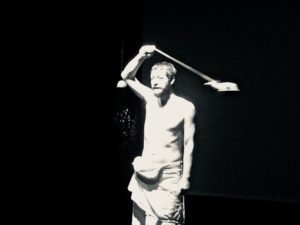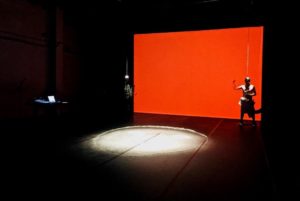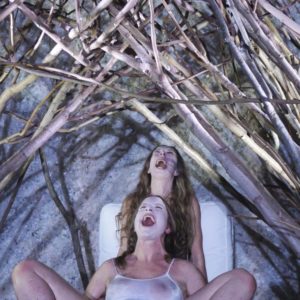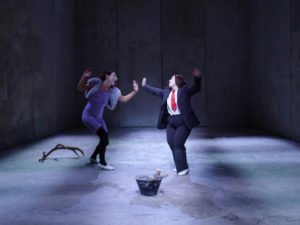Last weekend the 24th edition of the Festival Natura Dèi Teatri, an annual exhibition dedicated to contemporary performing arts curated in Parma by Lenz Foundation under the artistic direction of Maria Federica Maestri and Francesco Pititto, ended with a day full of events and emotions. To act as a common thread among the variegated proposals of this year’s programming, a conceptual suggestion taken from the research of the French philosophers Jean-Luc Nancy and Gilles Deleuze (the oxymoric complementarity between a striated and smooth creative space, an invitation to move into freedom, with no set goals) and the re-reading on several fronts of the mythological Agamemnon saga.
The grim vicissitudes of the family of the king of Mycenae who did not hesitate to sacrifice his daughter Iphigenia to the gods to set sail for the Greeks fleet, held back by contrary winds on they return from Troy, become a metaphor for the excesses and perversions of postmodernity, showing how the cultured and exasperated anxieties that the ancient Greeks formalized in tragic spectacle, are today anything but resolved. The texts of Iphigenia in Tauris and Iphigenia in Aulis by Euripides, Agamemnon and Le Coefore by Aeschylus were the starting point for a conscious sinking into the depths of human archetypes, where instinct, ethics and reason interpenetrate an incandescent amalgam of timeless impulses.
Clitennestra, aided by her lover Egisto, kills her husband Agamemnon to punish him for the alleged sacrifice of Iphigenia and betrayal with the slave Cassandra, second victim of her relentless desire for revenge. The son Oreste, at the behest of Apollo, enters the palace where Agamemnon was replaced by Egisto and kills his father’s killers by making justice triumph and releasing Argo from the traces of past atrocities. The story brings out a fatalistic and inflexible conception of justice, which inexorably collapses on the guilty even at the cost of generating new faults that will forever burden the fate of its human intermediaries. It is courageous and particularly appropriate to speak about responsibility and guilt in an individualistic era such as the one in which we find ourselves living, in which the digital dematerialization of interpersonal relationships seems to loosen the cause-effect relationship of human interactions and generate a wide limbo of telematic impunity in which to exorcise with the oppression the constant sense of loss that grips us.
The final day of Natura Dèi Teatri, Saturday 30 November, opened with the show by Slovenian Boris Kadin, invited in residence by Lenz Foundation to present, for the very first time, the performance Orestea. Dystopian, commissioned by the Festival in creative dialogue with a reflection on the Aeschylus trilogy conducted by Lenz. In medical language the dystopia is the displacement (generally by congenital malformation) of a viscus or tissue from its normal location and by extension indicates a representation of a future state of affairs, with which, contrary to utopia, highly negative political-social and technological situations are prefigured.
Dystopian is a contemporary aedo that hybridizes the rhythmic phrasing of rap with Balkan nostalgia, Dadaist non-sense and a sound carpet of strident acoustic effects. But Dystopian is also, like many of us, a postmodern murderer who condemns his father to intellectual and physical obsolescence by delegating his care to outsiders. He too is an “out-of-place organ” of the system because he refuses to numb his guilt with an ethical façade hygiene and emphasizes it by tracing it back to a genetic human predestination to kill that is passed down from one generation to another. Very successful was the staging which, by projecting the performer on a Pompeian red digital background, assimilated him to a character in a vascular painting immersed in a narrative marked by emblematic objects.
In Orestea # 1 Nidi, the second stage of the evening, the curtain opens on Clytemnestra’s torment, darkened by the recent nightmare of giving birth to a snake that sucks milk and blood from her breast, a clear omen of the anger of the gods towards her. The queen, a woman who speaks like a man, kills her husband Agamemnon, guilty of having returned from Troy, taking with him the young slave-trophy Cassandra. Murder, the chorus reasons, is the most daring act that passion has ever inspired in a woman, a subversion to the natural order of things.
The scenic action, compressed in a claustrophobic hybrid environment between the containment room and the antechamber of the prison, focuses on the conflicting encounter between Clytemnestra and Cassandra, a recently captured wild animal that follows the trail that leads to blood, whose prophetic ecstasy traces the misfortunes suffered in the past by the house of the Argolides that culminate with the imminent killing of Agamemnon and of herself. In this dramaturgy, Lenz operates a primary and pathological regression of classical tragedy, of which it is maintained the narrative structure and the basic assumption that evil calls another evil. The show, urgent and at times hysterical, has in my opinion its culminating moments in the animal death of the swan interpreted by Sandra Soncini (Clitennestra) with crude realism and in the rhyme Ahi, bad luck, disaster! hummed by Cassandra (Carlotta Spiaggiari). The tension, which accumulates without control for 50 minutes, results in the final catharsis, the birth-death-interpenetration of the two protagonists in a royal den.
A few seconds and a brief interval of light separate us from the third and last representation. Orestea # 2 Latte begins with the lament of Iphigenia and Elettra on the tomb of their father Agamemnon, where Oreste has already arrived in secret. The boy, after being recognized by the sisters who persuade him to carry out the revenge, introduces himself to his mother, in disguise, bringing the false news of his death. Death versus Death. Love against Love: Oreste is a prisoner of a concatenation of forced choices that clash with his youthful integrity, which Barbara Voghera‘s recitation returns intact and moving.
Here the family is undermined and dissected in its subterranean dynamics of oppression, deception and subordination, which find a monumental allegory in the almost liturgical imprint scene in which Clytemnestra feeds / poisons her children with milk-ink which as indelible as the guilt of which stain. The remedy is here, in this house – says the queen in a false attempt to stem the irreducibility of violence – It’s not out, it’s right here. It’s the fault of fate, it’s his fault. Oreste has revealed himself, wins the hesitations and drags the mother offstage where, deaf to her reasons, he executes her next to the corpse of Egisto. As in the Greek theater, even here the bloody act is only alluded to and its scope is magnified like the ghost of the queen, who returns to the scene to persecute the son with a persuasive voice, huddled in a cradle in the impossible attempt to obliterate the trauma of matricide.
Info:
 Boris Kadin, Orestea. Dystopyan – Ph Francesco Pititto
Boris Kadin, Orestea. Dystopyan – Ph Francesco Pititto
 Boris Kadin, Orestea. Dystopyan – Ph Francesco Pititto
Boris Kadin, Orestea. Dystopyan – Ph Francesco Pititto
 Lenz Fondazione, Orestea #1 Nidi – Ph Maria Federica Maestri
Lenz Fondazione, Orestea #1 Nidi – Ph Maria Federica Maestri
 Lenz Fondazione, Orestea #1 Nidi – Ph Maria Federica Maestri
Lenz Fondazione, Orestea #1 Nidi – Ph Maria Federica Maestri
 Lenz Fondazione, Orestea #2 Latte – Ph Maria Federica Maestri
Lenz Fondazione, Orestea #2 Latte – Ph Maria Federica Maestri
For all images: courtesy Lenz Fondazione – Natura Dèi Teatri
Graduated in art history at DAMS in Bologna, city where she continued to live and work, she specialized in Siena with Enrico Crispolti. Curious and attentive to the becoming of the contemporary, she believes in the power of art to make life more interesting and she loves to explore its latest trends through dialogue with artists, curators and gallery owners. She considers writing a form of reasoning and analysis that reconstructs the connection between the artist’s creative path and the surrounding context.






NO COMMENT